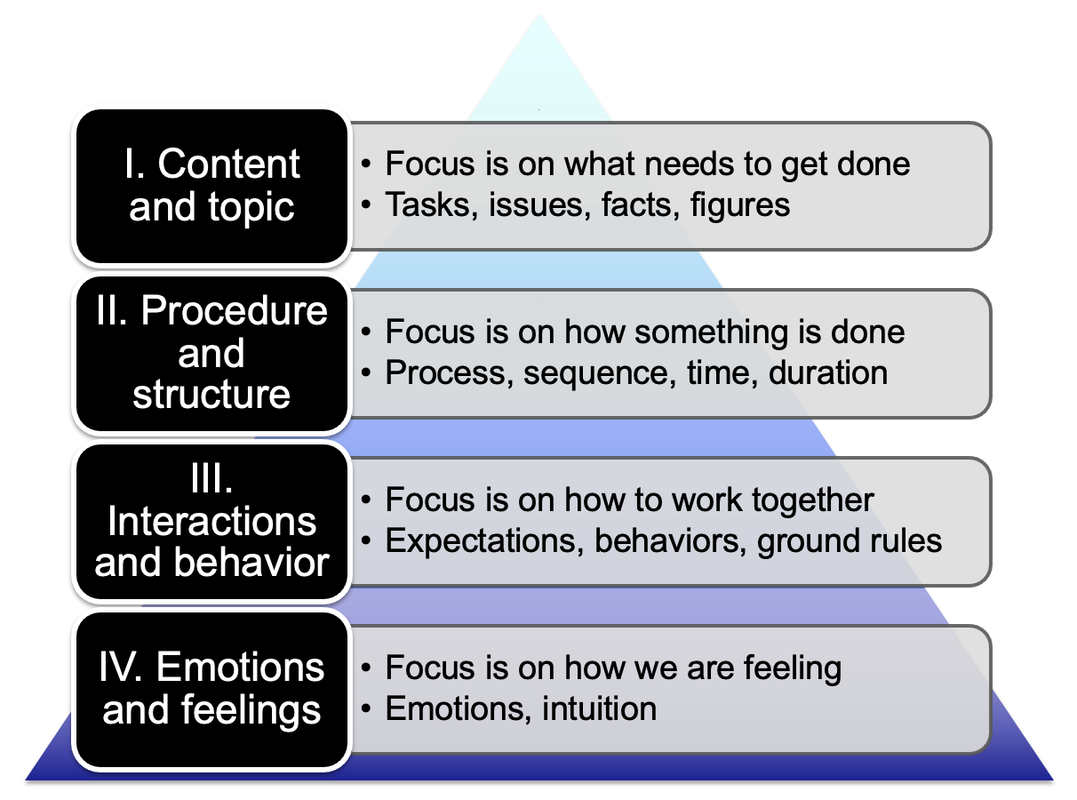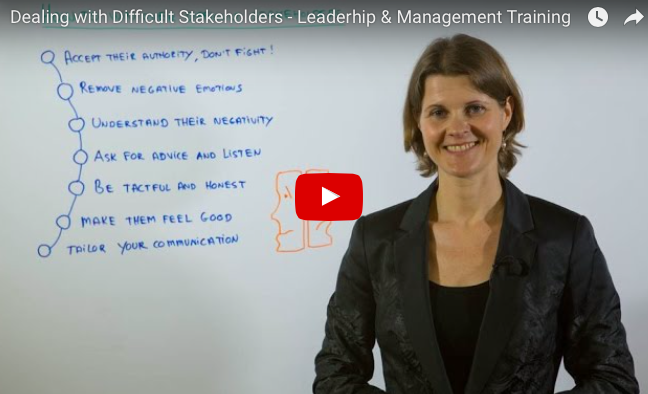One of the most important questions you can ask your stakeholder is: “how would you like me to communicate with you? And how would you like me to escalate issues to you?” Many people default to the same way of communicating with everyone, or they adjust their approach based on what they believe the stakeholder would like. Why not ask the question directly?
Communication is a vast topic and it’s not all that easy to get it right. In this post we take a look at the four levels of communication – a tool that will help you become more transformational in your interactions with others and to deepen your communication.
Irrespective of who you are communicating with, or the means you are using, there are four basic levels of communication: content, procedure, interactions and feelings. To be an effective communicator you need to be able to access all of the levels at the right time and not just stay at the content level. Let’s examine each level in turn.
When we communicate at a content level the focus of our communication is the topic being discussed. On a project this means that we would talk about the tasks that need to get done and the issues that need to be resolved. We draw in facts and figures, discuss the pros and cons, ask questions and give our point of view. This is the level that most project managers communicate at most of the time – and the level that they are most comfortable with. That seems to make sense. Talking about tasks, facts and logic should be firmly within the project manager’s comfort zone. After all, a project manager needs to make sure that the work gets done and that issues are resolved in an effective manner.
II. Procedure and structure
The second level is the procedure level. When we communicate at this level we discuss the structural aspects of the topic and the process of getting something done. It’s about time, duration, sequence, control points, and roles and responsibilities. Procedure is immensely important on a project and it’s hard to imagine that people who cannot access this level will get anywhere far in project management. Just consider the project initiation document. It’s largely about the procedures and controls behind the project, and how we will ensure that the project gets delivered. There are probably a few project situations, where the procedure level is not as prominent as it should be – for instance when we close out the project. At this point we don't always pay sufficient attention to the structural aspects of why the project was or was not delivered according to plan.
III. Interactions and behaviour
The interaction level goes deeper than the two previous levels. Here it’s about how team members deal with one another, which can be quite challenging for the average project manager to address. At this level we set expectations – not about what needs to get done and the processes we will use – but about how we will work together. This is about verbalising the behaviours between people and how we act towards each other. This level isn’t just important when the project starts up and the team is formed, but throughout the project’s life cycle. If team members aren’t treating each other the way they initially agreed, or if they are not collaborating effectively, it’s necessary to address it properly and talk it through.
IV. Emotions and feelings
The last of the four levels of communication is the emotional level where we express how we are feeling in certain situations and enquire about what’s going on for our team members or stakeholders. This is often the most difficult level for project managers to access because they haven’t been trained or educated in how to communicate about emotions. You might think that the emotional level isn’t relevant to project management, but it’s worth remembering that it’s people who deliver projects – not processes. And whenever people are involved there are also emotions. We don’t leave our emotions at home in the morning. We bring them with us to work. For project managers to be truly effective at engaging the team and building strong relationships with stakeholders they need to be able to communicate at this deeper level.
What level do you communicate at?
Many project managers make the mistake that they solely talk about content at level one when seeking to influence others, predominantly using logic and rational arguments. They may at times go to the structural level, as projects naturally involve a fair amount of processes, but very rarely will they talk about behaviours or even feelings at level three or four. Many think that they have to be as rational and business-like as possible, but they are missing the trick. We need to be able to access the deeper levels when required. Let’s look at some different project situations and how you can effectively use the four levels to go deeper into a conversation.
Example: Project kick-off
During a kick off meeting it’s custom to talk about project goals and what needs to get done. Hopefully there will also be a fair amount of discussion about time frames and roles and responsibilities. But to kick the project off on the best foot, there also has to be discussions about the ground rules and how team members would like to work with one another.
Level I – “It’s pretty exciting that we finally get to start this project. We have already talked about the deliverables. I’d like to spend a bit more time explaining the benefits and why this is such an important initiative for our firm.”
Level II – “Which collaborative tools would you like us to use? Who will make sure that we get the communication platform up and running by next week?
Level III – “I would like all of you to write down one ground rule for how you would like us to work together on this project. This could be any type of behaviour that you feel is important for a well functioning team.
Level IV – “How do you guys feel about the project? Is there anything else we need to consider to make you fully motivated?”
Example: Building stakeholder relationships
Managing stakeholders is a big part of any project managers job. Consider for a moment some of the stakeholders, or clients, that you need to influence and win the support of. How do you approach them and what do you talk to them about? You could for instance touch all four levels in this way:
Level I – “Thank you for taking the time to meet and talk about the project. Let me first explain what the project is all about and what the main requirements are to date. I’d love your feedback on whether you think we’ve missed anything out.”
Level II – “I’d like to discus the governance of the project and your specific role. Given your expertise we would like you to sit on the steering committee where you will represent the user community. The steering committee will meet once a month. Is that ok with you?”
Level III – “Can we agree that if you come across any issues you will raise them with me first? Then we can find a way to resolve it between us. From your side, how would you like me to escalate any issues to you?”
Level IV – “John, I get the sense that you are frustrated about the level of input we require from you on this project. Is that right? Your support is really important to us so what can we do to make this easier for you?”
Example: Delegating a task
Delegating work is something that all project managers have to do. Below is an example of how to use all levels of communication.
Level I – “Stuart, I would like you to run the next steering committee meeting whilst I’m on holiday. It will be a good opportunity for you, as you will get a chance to highlight all the good work that your team has done in the last month.
Level II – “You can use the slide deck that I used last time. I suggest that you don't change the sequence of the slides, but add new slides about your team’s achievements at the end. I’m happy to review them and give you feedback before I go.”
Level III – “In which ways would you like us to work together to get this done? What do you need from me?”
Level IV – “How do you feel about this opportunity? I know that you were quite nervous last time and I want to make sure that I give you the support you need to make this a good experience?”
Example: Giving feedback during a performance review
The final example is one where the project manager gives feedback to a team member. It’s important not just to stay at the surface but to also delve into behaviours and feelings.
Level I – “You’ve performed really well on this project Laura. You’ve delivered most of your assignments on time and the quality has been exceptionally high. I’m particularly impressed that you took the PMP exam during our most busy period.”
Level II – “I’m also really happy with how well you manage your personal time. I know that you always write a to-do list before you leave the office in the evening, and that’s definitely one to continue with.”
Level III – “One area where I feel there is room for improvement is your contribution to our team meetings. I would like you to speak up more and to share your views. What can we do to make it easier for you to contribute?
Level IV – “Laura, I feel that you sometimes hold back because you are afraid to be judged. You need to know that your input is really valuable and that I see you as a long-term member of the team. How do you feel about it?”
Summary – The four levels that we can communicate at are content, procedure, interactions and feelings. To influence stakeholders and lead a team in the most effective way, it’s necessary to make use of all four levels. Many managers and leaders have a tendency to communicate at a content level or a procedure level. They are not aware of how transformational it can be to also talk about behaviours and feelings in a professional setting.
If you liked this post, you may also like:
How good is your ability to build trust?
Top Tips for Providing Effective Feedback
6 Principles for building trusting Stakeholder relationships
How to create a strong team identity during kick-off














 RSS Feed
RSS Feed